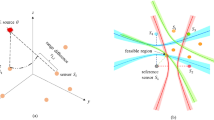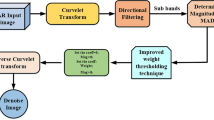Abstract
Recursive Least Square (RLS) is a popular algorithm for noise cancellation in non-stationary signals; however, it demands more computational resources and more difficult mathematical operations. Also, RLS has less performance stability. The present research explores a novel idea of an RLS adaptive noise cancellation through a modified method that uses an RLS adaptive filter by introducing an additional constant multiplier, along with their in-depth analysis. The proposed algorithm is analyzed using three primary performance metrics: mean square error (MSE), signal-to-noise ratio (SNR), and convergence rate. The obtained results demonstrate that the proposed algorithm has reduced the MSE by 79.65%, which leads to an improvement in SNR by 86.16% compared to the traditional RLS algorithm. The additional constant multiplier is optimized for SNR, and the optimized value is found to be equal to 0.65, which gives the best possible SNR value of 19.38 dB. Also, the proposed algorithm has been successfully applied to a real-world scenario in acoustic echo cancellation (AEC). The experimental setup for the echo canceller is simulated on MATLAB to measure the echo canceller efficiency in terms of MSE and echo return loss enhancement. Based on performance evaluation, the proposed algorithm has been found to better echo cancellation in AEC as compared to traditional RLS.














Similar content being viewed by others
Data Availability
The datasets generated during and/or analyzed during the current study are available on reasonable request.
References
F. Akingbade, I. Alimi, Acoustic echo cancellation using modified normalized least mean square adaptive filters. Int. J. Sci. Eng. Res. 5(5), 1175–1179 (2014)
Albu, F., Improved variable forgetting factor recursive least square algorithm, in 12th International Conference on Control Automation Robotics & Vision (ICARCV). IEEE, (2012). https://doi.org/10.1109/ICARCV.2012.6485421
F. Albu, C. Palelologu, A recursive least square algorithm for active noise control based on the Gauss-Seidel method, in 15th IEEE International Conference on Electronics, Circuits and Systems. IEEE, (2008). https://doi.org/10.1109/ICECS.2008.4674982
V. R.Balaji, P.S. Surabhi, An Investigation on Under water images of hydroacoustic environment using RLS algorithm, in 4th International Conference on Inventive Research in Computing Applications (ICIRCA) IEEE, (2022) p. 1307–1311. https://doi.org/10.1109/ICIRCA54612.2022.9985704
K.R. Borisagar, G.R. Kulkarni, Simulation and comparative analysis of LMS and RLS algorithms using real time speech input signal. Glob. J. Res. Eng. 10(5), 44–47 (2010)
Y. Chen, G. Yuantao, O.H. Alfred, Sparse LMS for system identification, in IEEE International Conference on Acoustics, Speech and Signal Processing. IEEE, (2009), p. 3125–3128. https://doi.org/10.1109/ICASSP.2009.4960286
J. Chhikara, J. Singh, Noise cancellation using adaptive algorithms. Int. J. Mod. Eng. Res. (IJMER) 2(3), 792–795 (2020)
C. Dai, J. Wang, J. Xie, W. Li, Y. Gong, Y. Li, Removal of ECG artifacts from EEG using an effective recursive least square notch filter. IEEE Access. 7, 158872–158880 (2019). https://doi.org/10.1109/ACCESS.2019.2949842
R. Dallinger, R. Markus, On robustness of coupled adaptive filters. in IEEE International Conference on Acoustics, Speech and Signal Processing IEEE, (2009) p. 3085–3088. https://doi.org/10.1109/ICASSP.2009.4960276
H. Deng, M. Doroslovacki, Proportionate adaptive algorithms for network echo cancellation. IEEE Trans. Signal Process. 54(5), 1794–1803 (2006). https://doi.org/10.1109/TSP.2006.872533
P.S.R. Diniz, Adaptive filtering (Germany, Springer, Berlin, 1997)
S. Dixit, N. Deepak, Hardware reduction in cascaded LMS adaptive filter for noise cancellation using feedback. Circuits Syst., and Signal Process. 38, 930–945 (2019). https://doi.org/10.1007/s00034-018-0896-3
S. Dixit, N. Deepak, LMS adaptive filters for noise cancellation: a review. Int. J. Electr. Comput. Eng. (IJECE) 7(5), 2520–2529 (2017). https://doi.org/10.11591/ijece.v7i5.pp2520-2529
D.L. Duttweiler, Proportionate normalized least-mean-squares adaptation in echo cancelers. IEEE Trans. Speech Audio Process. 8(5), 508–518 (2000). https://doi.org/10.1109/89.861368
E. Eleftheriou, D. Falconer, Tracking properties and steady-state performance of RLS adaptive filter algorithms. IEEE Trans. Acoust. Speech Signal Process. 34(5), 1097–1110 (1986). https://doi.org/10.1109/TASSP.1986.1164950
C. Elisei-Iliescu, C. Paleologu, J. Benesty, C. Stanciu, C. Anghel, S. Ciochina, Recursive least-squares algorithms for the identification of low-rank systems. IEEE/ACM Trans. Audio, Speech, Lang Process. 27(5), 903–918 (2019). https://doi.org/10.1109/TASLP.2019.2903276
D.A. Florêncio, S.M. Henrique, Multichannel filtering for optimum noise reduction in microphone arrays. in IEEE International Conference on Acoustics, Speech, and Signal Processing. Proceedings, (2001), 197–200.https://doi.org/10.1109/ICASSP.2001.940801
J. Fraden, Noise in sensors and circuits, in Handbook of Modern Sensors. (Springer, New York, 2015), pp.204–212. https://doi.org/10.1007/978-1-4419-6466-3
J.G. Harris, J. Jui-Kuo, C.P. Jose, Analog hardware implementation of continuous-time adaptive filter structures. Analog Integr. Circ. Sig. Process 18, 209–227 (1999). https://doi.org/10.1023/A:1008363406175
S. Haykin, B. Widrow, Least-Mean-Square Adaptive Filters (John Wiley & Sons. Inc, New Jersey, 2003). https://doi.org/10.1002/0471461288
S.S. Haykin, Adaptive systems for the signal process, in Advanced Signal Processing Theory and Implementation for Sonar Radar and Non-Invasive Medical Diagnostic Systems, 2nd edn., ed. by S. Stergiopoulos (CRC Press, Boca Raton, 2017). https://doi.org/10.4324/9781315219042
S.S. Haykin, Adaptive Filter Theory (Pearson Education India, Bangalore, 2008)
R.A. Horn, C.R. Johnson, Matrix analysis (Cambridge University Express, Cambridge, 1985), p.561. https://doi.org/10.5555/5509
M. Kalamani, S. Valarmathy, M. Krishnamoorthi, Adaptive noise reduction algorithm for speech enhancement. Int. J. Electr. Commun. Eng. 8(6), 1014–1021 (2014). https://doi.org/10.12988/ams.2014.45365
R.E. Kalman, A new approach to linear filtering and prediction problems. Am. Soc. Mech. Eng. 82(1), 35–45 (1960). https://doi.org/10.1115/1.3662552
N. Kalouptsidis, S. Theodoridis, Adaptive system identification and signal processing algorithms (Prentice-Hall Inc, Upper Saddle River, 1993)
G. Kim, H. Lee, J. Chung, J. Lee, A delay relaxed RLS-DCD algorithm for real-time implementation. IEEE Trans. Circuits Syst. II Express Briefs 65(1), 61–65 (2017). https://doi.org/10.1109/TCSII.2017.2706367
R. Kono, M. Komatsu, H.Matsumoto (2022), Higher convergence adaptive equalization method with noise removal function using total least squares method. in 21st International Symposium on Communications and Information Technologies (ISCIT) IEEE, (2022), p. 307–311. https://doi.org/10.1109/ISCIT55906.2022.9931266
J. Krolik, M. Joy, S. Pasupathy, M. Eizenman, A comparative study of the LMS adaptive filter versus generalized correlation method for time delay estimation. IEEE Int Conf Acoust, Speech, Signal Process. 9, 652–655 (1984). https://doi.org/10.1109/ICASSP.1984.1172302
W.C. Lee, C.C Jay Kuo, Musical onset detection based on adaptive linear prediction, in IEEE International Conference on Multimedia and Expo. IEEE, (2006), p. 957–960. https://doi.org/10.1109/ICME.2006.262679
S.H. Leung, C.F. So, Gradient-based variable forgetting factor RLS algorithm in time-varying environments. IEEE Trans. Signal Process. 53(8), 3141–3150 (2005). https://doi.org/10.1109/TSP.2005.851110
A.C. Mugdha, F.S. Rawnaque, M.U. Ahmed, A study of recursive least squares (RLS) adaptive filter algorithm in noise removal from ECG signals, in International Conference on Informatics, Electronics & Vision (ICIEV) IEEE, (2015), p. 1–6. https://doi.org/10.1109/ICIEV.2015.7333998
V.H. Nascimento, Y.V. Zakharov, RLS adaptive filter with inequality constraints. IEEE Signal Process. Lett. 23(5), 752–756 (2016). https://doi.org/10.1109/LSP.2016.2551468
C. Paleologu, J. Benesty, S. Ciochină, A practical variable forgetting factor recursive least-squares algorithm, in 11th International symposium on electronics and telecommunications (ISETC). IEEE, (2014), p. 1–4. https://doi.org/10.1109/ISETC.2014.7010812
R. Pogula, T.K. Kumar, A novel RLS based adaptive filtering method for speech enhancement. World Acad. Sci., Eng.Technol., Int. J. Electr., Comput., Electron. Commun. Eng. 9(2), 153–158 (2015). https://doi.org/10.5281/zenodo.1099384
P. Prandoni, V. Martin, An FIR cascade structure for adaptive linear prediction. IEEE Trans. Signal Process. 46(9), 2566–2571 (1998). https://doi.org/10.1109/78.709548
N.G. Prelcic, P.G. Fernando, M. Elena Domı́nguez Jiménez, Wavelet packet-based subband adaptive equalization. Signal Process. 81(8), 1641–1662 (2001). https://doi.org/10.1016/S0165-1684(01)00077-9
L. Rugini, L. Geert, Basis expansion adaptive filters for time-varying system identification, in 2nd IEEE International Workshop on Computational Advances in Multi-Sensor Adaptive Processing. IEEE, (2007), p. 153–156. https://doi.org/10.1109/CAMSAP.2007.4497988
A.G. Rusu, S. Ciochina, C. Paleologu, J. Benesty, Cascaded RLS adaptive filters based on a Kronecker product decomposition. Electronics 11(3), 409 (2022). https://doi.org/10.3390/electronics11030409
S. Song, J.S. Lim, S.J. Baek, K.M. Sung, Gauss Newton variable forgetting factor recursive least squares for time varying parameter tracking. Electron. Lett. 36(11), 988–990 (2000). https://doi.org/10.1049/el:20000727
K.L. Sudha, Performance analysis of new time varying LMS (NTVLMS) adaptive filtering algorithm in noise cancellation system, in International Conference on Communication, Information & Computing Technology (ICCICT) IEEE, (2015), p. 1–6. https://doi.org/10.1109/ICCICT.2015.7045710
R.K. Thenua, S.K. Agarwal, Simulation and performance analysis of adaptive filter in noise cancellation. Int. J. Eng. Sci. Technol. 2(9), 4373–4378 (2010)
H.X. Wen, S.Q. Yang, Y.Q. Hong, H. Luo, A partial update adaptive algorithm for sparse system identification. IEEE/ACM Trans. Audio, Speech, Lang. Process. 28, 240–255 (2019). https://doi.org/10.1109/TASLP.2019.2949928
B. Widrow, R.E. Kalman, N. DeClaris, Adaptive Filters-Aspects of Network and System Theory (Holt Rinehart and Winston, New York, 1971), pp.563–586
B. Widrow, W. Eugene, Adaptive signal processing for adaptive control. IEEE Int Conf. Acoust., Speech, Signal Process., 9, 191–194 (1984). https://doi.org/10.1109/ICASSP.1984
B. Widrow, J.R. Glover, J.M. McCool, J. Kaunitz, C.S. Williams, R.H. Hearn, J.R. Zeidler, J.E. Dong, R.C. Goodlin, Adaptive noise cancelling: principles and applications. Proc. IEEE 63(12), 1692–1716 (1975). https://doi.org/10.1109/PROC.1975.10036
N.R. Yousef, H.S. Ali, Fixed-point steady-state analysis of adaptive filters. Int. J. Adapt. Control Signal Process. 17(3), 237–258 (2003). https://doi.org/10.1002/acs.738
Z. Zalevsky, M. David, Fractional wiener filter. Appl. Opt. 35(20), 3930–3936 (1996). https://doi.org/10.1364/AO.35.003930
Funding
No funding/grant was received to assist with the preparation of this submitted manuscript.
Author information
Authors and Affiliations
Corresponding author
Ethics declarations
Conflict of interest
All authors have no conflict of interest.
Additional information
Publisher's Note
Springer Nature remains neutral with regard to jurisdictional claims in published maps and institutional affiliations.
Rights and permissions
Springer Nature or its licensor (e.g. a society or other partner) holds exclusive rights to this article under a publishing agreement with the author(s) or other rightsholder(s); author self-archiving of the accepted manuscript version of this article is solely governed by the terms of such publishing agreement and applicable law.
About this article
Cite this article
Yadav, N.K., Dhawan, A., Tiwari, M. et al. Modified Model of RLS Adaptive Filter for Noise Cancellation. Circuits Syst Signal Process 43, 3238–3260 (2024). https://doi.org/10.1007/s00034-024-02605-5
Received:
Revised:
Accepted:
Published:
Issue Date:
DOI: https://doi.org/10.1007/s00034-024-02605-5




